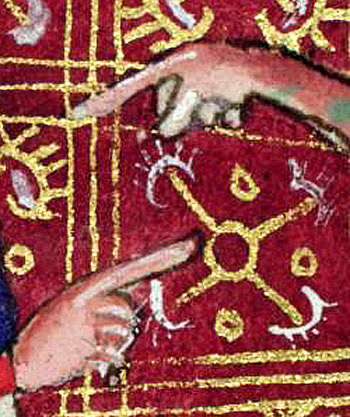Guy and Colbrond
General Information
Plot Summary

Guy of Warwick is a great English warrior, who anonymously performs many feats before returning home dressed as a poor pilgrim. Meanwhile, King Athelstan is being attacked by the Danish king, Avelocke, and his champion, a ferocious giant. When no English knights dare fight him, an angel instructs Athelstan to ask the elderly pilgrim who arrives at his gates. Guy pleads weakness, but eventually accepts God’s will. No armour fits him, until Athelstan sends to Felice for Guy’s old armour and his sword.
When the champions arrive at the battleground, Guy prays while his opponent selects his weapons from a large collection. The two kings vow to leave England if their champion loses, and, at the giant’s suggestion, he and Guy row out to an island, where Guy casts one of the boats adrift, saying that only the winner will need to return. The battle rages back and forth, until the giant asks Guy’s leave to take a drink. Guy agrees, and the battle resumes. When Guy becomes thirsty, however, the giant demands that he reveal his name. Learning that his opponent is the famous hero, he refuses to let him drink. Guy leaps into the river and then, rebuking the giant for his treachery, strikes his helmet. When the giant retaliates, Guy’s sword breaks in his chest. The Danes celebrate, and the giant demands that Guy surrender. He refuses, and, seizing an axe from the giant’s own collection, strikes off his arm and his head.
Avelocke flees and the English bury the giant, laughing at his weapons. Guy refuses rewards, attributing his victory to Christ, but processes to Winchester with Athelstan, where the giant’s weapons are displayed in St Swithun’s church. Just before he departs, Guy reveals his identity to the king, asking him to keep it secret. He travels to Warwick, where he enters his wife’s hall among the thirteen pilgrims that she feeds every day. Refusing her offer to dine there for ever, he makes his way to a nearby hermitage where he lives a frugal and holy life on an allowance from Felice. When a vision of St Michael announces his impending death, Guy sends his page to Felice with a ring. Learning that the hermit is her husband, she rushes to the hermitage, where she falls at his bedside and laments: together for forty days, they have been apart for thirty three years, and their son, Reinbroun, has been stolen away. When she regains consciousness, Felice travels to Athelstan, and learns that Guy defeated the Danes. Athelstan wants to bury Guy in Winchester, but his body cannot be moved. He is buried before the hermitage altar, where he is soon joined by Felice, who dies after forty days. An abbey is founded in their honour, where monks sing for their souls.
From: John. W. Hales and Frederick J. Furnivall, eds. Bishop Percy's Folio Manuscript: Ballads and Romances. London: N. Trübner & Co., 1867. Volume 2, pp. 527-49.
Manuscript: London, British Library, Additional MS 27879 (Percy Folio)
Manuscripts
Click a title below to search for all romances in that manuscript.